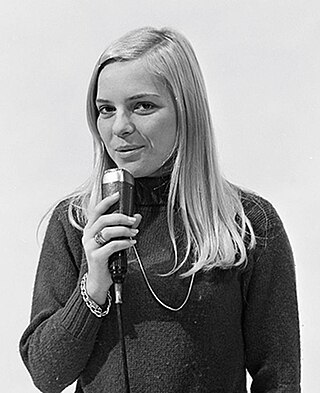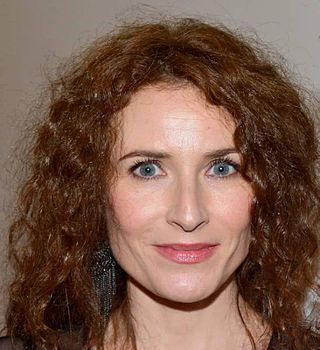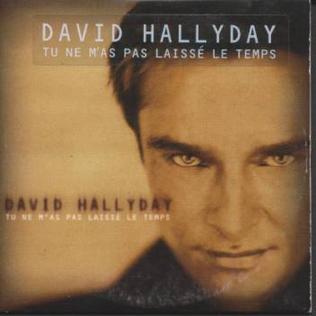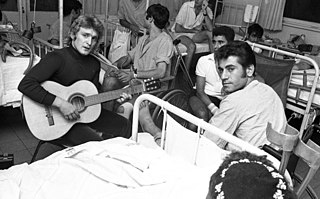Related Research Articles

Isabelle Geneviève Marie Anne Gall, known professionally as France Gall, was a French yé-yé singer. In 1965, at the age of 17, she won the tenth edition of the Eurovision Song Contest with the song "Poupée de cire, poupée de son", representing Luxembourg. Later in her career, she became known for her work with singer-songwriter Michel Berger, whom she married in 1976. Her most successful singles include "Résiste", "Ella, elle l'a" and "Évidemment".

Frédérique Hoschedé, better known by the stage name Dorothée, is a French singer and television presenter. She was a continuity announcer on French public broadcaster Antenne 2 from 1977 to 1983, but she is best known for having presented children's television shows like Les mercredis de la jeunesse (1973), Dorothée et ses amis (1977–1978), Récré A2 (1978–1987), and especially Club Dorothée (1987–1997), which totalled up to about thirty hours of broadcast per week and popularized Japanese animation in France.

Elsa Lunghini, known mononymously as Elsa, is a French singer and actress. She was a teenage pop-star in the late-1980s. In 1986, she was the youngest singer to reach number one in the French charts, with the single "T'en va pas", and she went on to sell millions of records during the decade. Elsa, her album of 1988, had achieved double-platinum status by 1993.

Dali is a French-language album released in 1984 by French - Italian singer Dalida.

Gilbert Montagné is a French singer, musician, pianist and organist from the Ménilmontant neighbourhood of Paris and Bourbonnais historical region of central France. Blind since shortly after birth, he is best remembered for his international hit "The Fool" which was a number 1 single across Europe and South America in 1971, as well as his songs "On va s'aimer" (1983) and "Les Sunlights des tropiques" (1984). In France, he is still a popular albums and concert artist, having toured and sung with the likes of Johnny Hallyday and Kool & the Gang.

François Feldman is a French singer. He had a great success in the 1980s and the 1990s in France.
Leslie Bourgouin, better known by her mononym Leslie, is a French pop-R&B singer. Her father is Vietnamese and Polynesian while her mother is French. She is married to French music producer Djamel Ferazi, known as Kore, with whom she has a son.

Julie Pietri is a French pop singer, best known for her single "Ève lève-toi", which was number-one on the French SNEP Singles Chart in November 1986.

Didier René Henri Barbelivien is a French author, lyricist, songwriter and singer. Beginning in the 1970s, he wrote a number of successful songs for artists such as: Dalida, Johnny Hallyday, Michel Sardou, Daniel Guichard, Claude François, Gilbert Montagné, Sylvie Vartan, Patti Layne, Gilbert Bécaud, Enrico Macias, Demis Roussos, Mireille Mathieu, Hervé Vilard, Michèle Torr, C. Jérôme, Christophe, Julio Iglesias, Sheila, Nicole Croisille, Patricia Kaas, Éric Charden, Jean-Pierre François, Michel Delpech, Philippe Lavil, Elsa, Gérard Lenorman, Ringo, Garou, Corynne Charby, David and Jonathan, and Caroline Legrand among others.

Ronnie Bird is a French singer.
Jil Caplan is a French singer and songwriter.

"Tu ne m'as pas laissé le temps" is a 1999 song recorded by French artist David Hallyday. It was the lead single from his album Un Paradis / Un Enfer, released about two weeks after the single, in June 1999. It was a hit in France and Belgium (Wallonia) and remains to date David Hallyday's most successful single.
Rose Laurens, previously billed as Rose Merryl, was a French singer-songwriter, known for her 1982 single "Africa", a top-three hit in several European countries. She was also famous for portraying the character of Fantine, on the original 1980 French concept album of Les Misérables, singing "L'air de la misère" and "J'avais rêvé d'une autre vie" two songs later adapted into English as "On My Own" and "I Dreamed a Dream" respectively.

Ça ne change pas un homme is a 1991 album recorded by French singer Johnny Hallyday. It was in late December 1991 and achieved success in France, where it debuted at a peak at #3 on the charts on January 1, 1992, and totalled 43 weeks on the chart. It provided four singles in France, including two top ten hits: "Ça ne change pas un homme" (#7), "Dans un an ou un jour" (#7), "Et puis je sais" (#16) and "True to You" (#18).

Nicolas Peyrac is a French musician, writer and photographer.

Daniel Bevilacqua, better known by the stage name Christophe, was a French singer and songwriter. He was born in the Paris suburb of Juvisy-sur-Orge, to an Italian father.

Prosper Charles Bensoussan professionally known as Philippe Clair was a Moroccan-French actor, director, producer, screenwriter, and popular humorist. Along with fellow French directors Max Pécas and Richard Balducci, his name is synonymous with the golden age of camp and low comedy in French cinema.
"Pile ou face" is a song by French model, actress and singer Corynne Charby. She released it in 1987 as a single and on the album Toi.
"Boule de flipper" is a song by French model, actress and singer Corynne Charby. Written by Jean-Michel Bériat and Christophe and produced by Franck Yvy, it was initially released in 1986 as her debut single and later appeared on her album Toi issued in 1987.
"Pas vu pas pris" is a song by French model, actress and singer Corynne Charby from her 1987 album Toi. It was also released as a single.
References
- 1 2 3 Corynne Charby's biography MCM.net Archived 25 October 2007 at the Wayback Machine (Retrieved 10 February 2008)
- 1 2 Peak positions of Corynne Charby's singles in French Singles Chart Lescharts.com (Retrieved 10 February 2008)
- ↑ Johnny Hallyday – Les duos "1987" Johnnymusic.fr (Retrieved 10 February 2008)
- ↑ Corynne Charby's certifications Chartsinfrance.net Archived 24 June 2007 at the Wayback Machine (Retrieved 10 February 2008